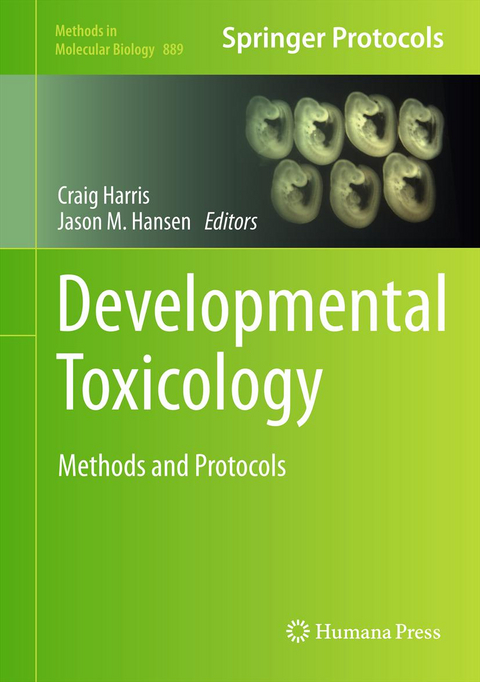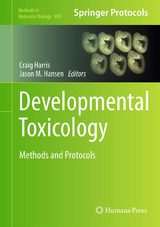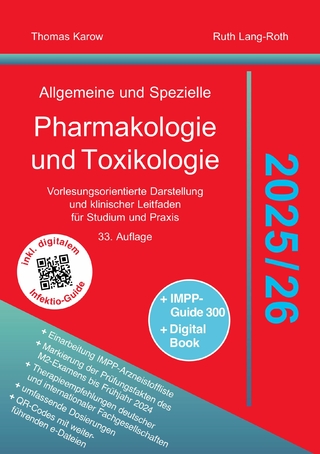Developmental Toxicology
Humana Press Inc. (Verlag)
978-1-61779-866-5 (ISBN)
Authoritative and practical, Developmental Toxicology: Methods and Protocols is a valuable resource to those planning experiments to investigate consequences of environmental, nutritional, or chemical effects caused during development.
Volume Overview - Introduction.-In Vivo Models of Developmental Toxicology.-Caenorhabditis Elegans as a Model in Developmental Toxicology.-Zebrafish Embryo Developmental Toxicology Assay.-Gene Knockdown by Morpholino-modified Oligonucleotides in the Zebrafish (Danio rerio) Model: Applications for Developmental Toxicology.-An Amphibian Model for Studies of Developmental Reproductive Toxicity.-Avian Models in Teratology and Developmental Toxicology.-Overview of In Vitro Models in Developmental Toxicology.-Primary Cell and Micromass Culture in Assessing Developmental Toxicity.-Embryonic Stem Cell Test (EST): Stem cell Use in Predicting Developmental Cardiotoxicity and Osteotoxicity.-Mouse Embryonic Stem Cell Adherent Cell Differentiation and Cytotoxicity (ACDC) Assay.-The Murine Limb Bud in Culture as an In Vitro Teratogenicity Test System.-Rodent Whole Embryo Culture.-Rabbit Whole Embryo Culture.-Assessment of Xenobiotic Biotransformation Including Reactive Oxygen Species Generation in the Embryo using Benzene as an Example.-Methodological Approaches to Cytochrome P450 Profiling in Embryos.-Analysis of Nrf2-Mediated Transcriptional Induction of Antioxidant Response in Early Embryos.-Regulation and Control of AP-1 Binding Activity in Embryotoxicity.-Thioredoxin Redox Status Assessment During Embryonic Development: The Redox Western.-Methods for the Determination of Plasma or Tissue Glutathione Levels.-Oxidative Stress, Thiols, and Redox Profiles.-A Review of Toxicogenomic Approaches in Developmental Toxicology.-Epigenetic Approaches and Methods in Developmental Toxicology: Role of HDAC Inhibition in Teratogenic Events.-DNA Methylation Screening and Analysis.-Assessment of Histiotrophic Nutrition using Fluorescent Probes.-Diabetic Embryopathy.-Gene Expression Analysis in Developing Embryos: In situ Hybridization.-Assessment of Gross Fetal Malformations: The Modernized Wilson Technique and Skeletal Staining.
| Reihe/Serie | Methods in Molecular Biology ; 889 |
|---|---|
| Zusatzinfo | XII, 471 p. |
| Verlagsort | Totowa, NJ |
| Sprache | englisch |
| Maße | 178 x 254 mm |
| Themenwelt | Medizin / Pharmazie ► Medizinische Fachgebiete ► Pharmakologie / Pharmakotherapie |
| Medizin / Pharmazie ► Pharmazie | |
| Studium ► 2. Studienabschnitt (Klinik) ► Pharmakologie / Toxikologie | |
| Naturwissenschaften ► Biologie ► Genetik / Molekularbiologie | |
| ISBN-10 | 1-61779-866-5 / 1617798665 |
| ISBN-13 | 978-1-61779-866-5 / 9781617798665 |
| Zustand | Neuware |
| Informationen gemäß Produktsicherheitsverordnung (GPSR) | |
| Haben Sie eine Frage zum Produkt? |
aus dem Bereich




